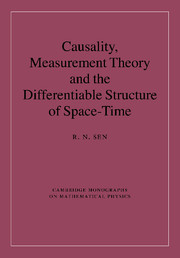Book contents
- Frontmatter
- Contents
- Preface
- Acknowledgements
- To the reader
- Prologue
- Part I Causality and differentiable structure
- Part II Geometrical points and measurement theory
- Introduction to Part II
- 6 Real numbers and classical measurements
- 7 Special topics in quantum mechanics
- 8 Von Neumann's theory of measurement
- 9 Macroscopic observables in quantum physics
- 10 Sewell's theory of measurement
- 11 Summing-up
- 12 Large quantum systems
- Epilogue
- Mathematical appendices
- List of Symbols for Part I
- References
- Index
12 - Large quantum systems
Published online by Cambridge University Press: 04 August 2010
- Frontmatter
- Contents
- Preface
- Acknowledgements
- To the reader
- Prologue
- Part I Causality and differentiable structure
- Part II Geometrical points and measurement theory
- Introduction to Part II
- 6 Real numbers and classical measurements
- 7 Special topics in quantum mechanics
- 8 Von Neumann's theory of measurement
- 9 Macroscopic observables in quantum physics
- 10 Sewell's theory of measurement
- 11 Summing-up
- 12 Large quantum systems
- Epilogue
- Mathematical appendices
- List of Symbols for Part I
- References
- Index
Summary
The aim of this final chapter of Part II is rather different from that of the preceding chapters. It is to provide a glimpse into the generalizations of the formalism of quantum mechanics on Hilbert space that are required to describe the symmetries and dynamics of systems with infinitely many degrees of freedom, owing to the qualitative differences that arise when the number of degrees of freedom tends to infinity.
The burden of the preceding chapters was that the notion of a geometrical point is as meaningful in quantum physics as it is in classical physics. The argument involved a lengthy excursion into quantum-mechanical measurement theory. During this excursion, we found that the notion of design of the experiment played an essential role.
An experiment, no matter how ingenious, does not create laws of nature; it substantiates, or refutes, an assumed law. According to the dichotomy between laws of nature and initial conditions that was posited by Wigner (page 206), the role of human intervention in an experiment is to realize, under controlled and repeatable conditions, a conjunction of initial conditions that may be improbable in nature. Seen in this light:
(i) The failure of von Neumann's theory proper to explain wave function collapse is either a failure of the theory to establish control over complicated initial conditions or an indicator of as-yet-undiscovered laws of nature; the success of Sewell's theory suggests that it is the former, and not the latter.
[…]
Information
- Type
- Chapter
- Information
- Publisher: Cambridge University PressPrint publication year: 2010
